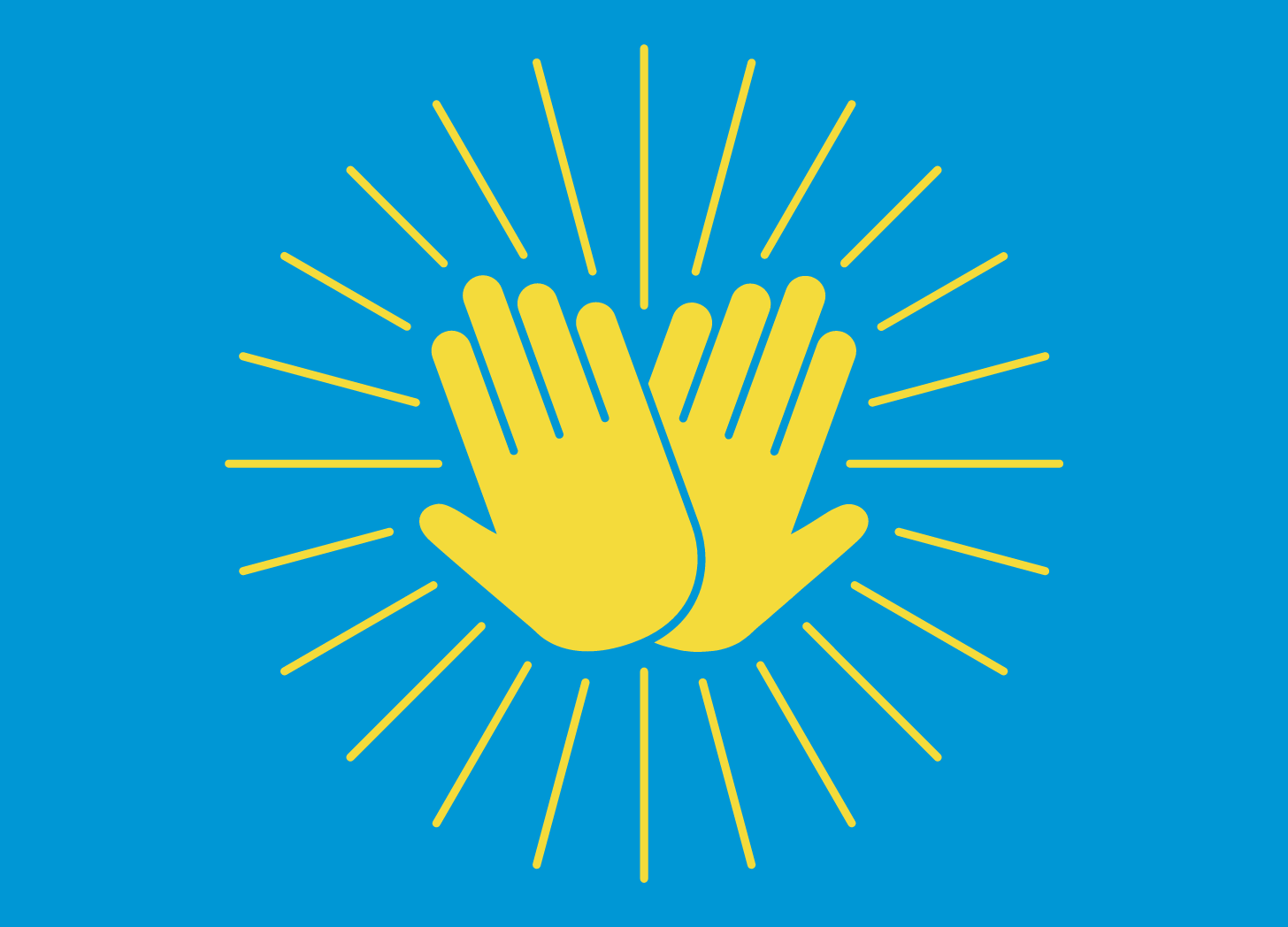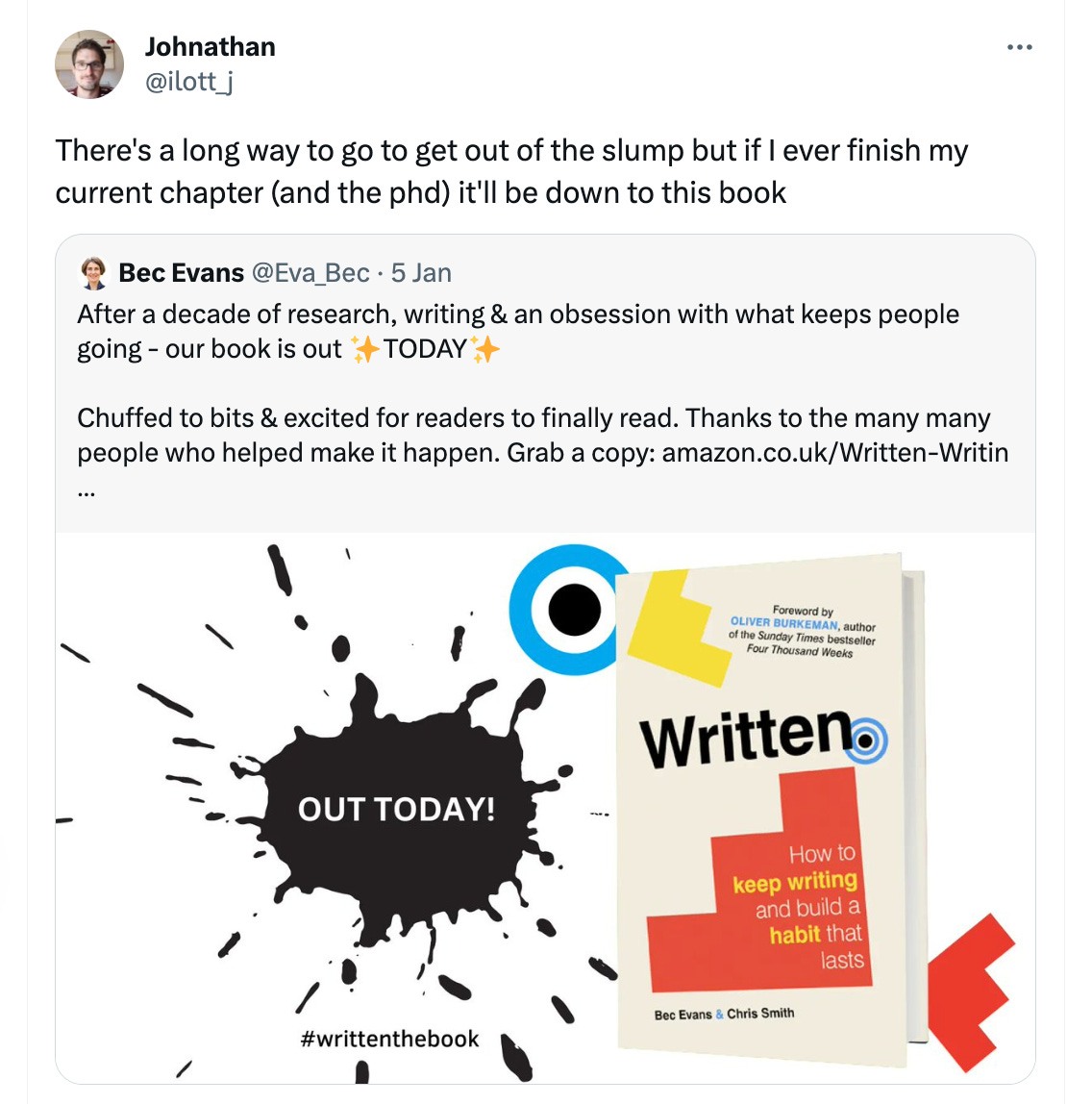The problem with motivation
Bec wafts about in a kaftan offering motivational advice, Michaela Coel on shitty first drafts, early-bird offer for our next Writing RESET course & lots of lovely writing links.
A couple of weeks ago I was introduced as a ‘motivational coach’. I was running workshops for a novel-writing school and while it was meant as a compliment, the description made me feel a tad uncomfortable.
Don’t get me wrong, I’m flattered to be thought of as someone who can inspire people to achieve their dreams. Motivation is great. Who doesn’t love that feeling of purpose, pumped full of action-oriented and goal-directed energy? But it takes more than motivation to keep writing.
We often think that in order to write we need to feel ready, inspired and driven. But that’s not always true. If we only write when we are ‘motivated’ it makes it harder to write when we’re not - the absence of motivation can lead us to quit.
Our fickle friend
Stanford-based social scientist BJ Fogg1 describes motivation as our fickle friend - someone who’s great fun on a big night out, but you wouldn’t rely on for anything important. He researched the relationship between motivation and our ability to take action and change our behaviour, in short, how motivation impacts developing new habits.
When we are highly motivated we are able to do hard things. It can be transformational as we push ourselves beyond our capability. But unfortunately, motivation fades and along with it goes our ability to act.
Keep writing when motivation fades
Understanding this relationship means we can keep writing when we no longer feel motivated. By all means, set yourself audacious goals and push yourself when you can, but when you’re not feeling in the mood, the answer is to scale back, go small.
Showing up and taking a small step will keep the momentum going, if you keep going, you’ll build a habit - which after all is the thing we really want.
We’ve found that with writing, momentum often leads to motivation; that showing up regularly makes us more like to keep going.
Keep writing, Bec
What do you call a first draft?
For years, I’ve dreamed of writing a novel. The longer I put it off, the harder it became to write, the idea of it was overwhelming which hampered my ability to start. One way to scale back the ‘dream’ was to think of the draft as deliberately imperfect.
As Ernest Hemingway famously said, “the first draft of anything is shit.”
Writers have come up with brilliant expectation-lowering descriptions for their first drafts, Anne Lamott has encouraged others with the Shitty First Draft in her brilliant book on writing, Bird by Bird. From shitty to vomit, exploratory or Frankendraft. What do you call yours? I’d love to hear - add a comment below.
And yes, I am telling you this because after a lifetime of dreaming, I finally completed the first draft of my novel - introducing ‘The Hot Mess’.
“I call my initial drafts ‘vomit drafts’. They’re not intended to be good, pretty or entirely sensible. They’re a first attempt. So you should just do it and expect it to be shit. Then keep going. It will get better.”
- Michaela Coel, writer and actor
Want a writing habit that lasts?
We’ve just released an early bird offer on our Six-Week Writing RESET coaching programme. Enrol by July 31st for the early bird price of £199 instead of the full price of £299.
What is RESET? Over six weeks we help you identify the writing tactics that work (and don’t work) for you and create a plan of action for future writing success.
Along the way we give you the tools to set realistic goals, build your writing confidence and give you tips on managing doubt and beating procrastination.
If you’ve read our book Written you’ll love RESET - join us!
What people say about RESET
The programme is insightful, thought-provoking and has led to genuine change in how I approach not only my writing but other life goals. – Catherine, YA author
Instead of prescribing a formula, RESET gave me the tools to discover productive and consistent writing habits. – Will, lecturer
RESET has given me the time and permission to explore what works in a way I wouldn’t have allowed myself to do by myself. - Mel, novelistI haven't enjoyed writing since I finished school. RESET helped me find joy in the craft again. - AM Goodhart, poet
We love recommendations like this!
Jonathan commented that: “One of the best things about it is the reassurance that struggling at times is part of the process and it's okay. It felt really important to hear that.”
He’s right. It’s hard! But by acknowledging that, perhaps accepting it, you can keep going through both the easy and the tough bits.
Written is available now from all good independent bookshops and Amazon UK and Amazon US.
🔗 A few links we love
Oliver Burkeman’s advice for dealing with overwhelm: “try dedicating a portion of daily time to it that’s significantly smaller than you believe it requires. Then, when time’s up each day, stop.” Read more in his newsletter The Imperfectionist.
The School of Life on the nature and causes of procrastination: and The New Yorker’s catalogue of procrastination. I’m actively avoiding something boring and hard - how about you?
Anne-Laure Le Cuff of Ness Labs explains how to turn Fear of Failure into Increments of Curiosity.
Not sure I’m curious enough to deliver a book reading naked, but Nell Frizzell was: ‘Every writer’s deepest fear’: what happened when I gave a book talk completely nude.
“A book is made of neither numbers nor words. It is, instead, a feeling.” What gets a first draft done? Katherine May explores consistency and faith when writing in her newsletter The Clearing.
Gretchen Rubin’s ideas for sparking creativity using the five senses.
Libraries are ace. We’d like to live in a world where we didn’t have to fight and argue for them, but we do (thanks capitalism). Researchers put a figure on their value, finding “library services in England can generate social benefits to their communities to a value of at least £3.4bn per year in relation to the three value dimensions investigated. Their modelling also suggests that libraries’ return on investment is at least six times the known annual cost of running libraries nationally. Read the report or this article in The Guardian.
This newsletter wraps up our month of focussing on small steps. You can read previous articles including:
How to start writing and Dog biscuits and bite size chunks.
If, like us, you like to geek out over graphs and equations you can read more about The Fogg Behavior Model in our book Written where we describe how Behavior (B) happens when Motivation (M), Ability (A), and a Prompt (P) come together at the same moment. It can be summarised as B=MAP. Find out more about Fogg at his website or his brilliant book Tiny Habits.









I call mine the 'dreck', rhymes with 'wreck' :)